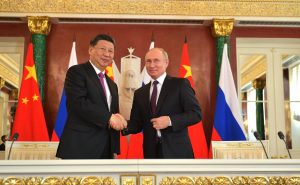With a new U.S. president in the White House facing strong pressure to be tough with both Russia and China, could this test the robustness of the Sino-Russian partnership – or strengthen it?
Many policymakers and commentators in the West interpret the Sino-Russian relationship as predominantly shaped by the pressure put on those two states by the United States. Following this logic, we should have expected an acceleration of Sino-Russian collaboration since Washington termed both China and Russia “strategic competitors” in the 2017 National Security Strategy, and since the U.S. National Defense Strategy in 2018 warned that the United States might have to fight a war on two fronts.
A RAND paper from 2018 spoke of Russia as a “rogue state” whilst describing China as a “peer” in relation to the U.S. – the implication being that Russia could be more easily discounted, while China remained too strong a geoeconomic force to ignore. Biden has echoed this description, describing Russia as an opponent and China as a serious competitor.
The shift in U.S. policy toward China – away from engagement and towards neo-containment – has potentially increased the value of closer cooperation with Moscow for Beijing. However, Sino-Russian cooperation for the last couple of years has had mixed success.
In some areas, such as political and normative opposition toward the West, energy, or security, the relationship has flourished. The anti-American rhetoric of Xi Jinping has begun to resemble that of Vladimir Putin’s 2007 Munich speech. Russia and China have improved their positions within the U.N. system, including getting elected to the Human Rights Council.
On the other hand, the obstacles that prevented both sides from entering into a fully-fledged alliance have remained in place. Neither side wants to underwrite the other’s aggressive policies, for example Russia’s treatment of Ukraine or Chinese hostilities in the South China Sea. Furthermore, Russia has limited capabilities to help China develop economically in rivalry with the United States. Although Moscow has indicated strong opposition to the U.S. roll-out of INDOPACOM (the new U.S. command in the Asia-Pacific), describing the concept of the “Indo-Pacific” as “destructive,” Russia cannot offer China much in areas such as trade, investment, or technology.
Moreover, Beijing’s increasingly aggressive policy is directed to Russia’s traditional partners in Asia, such as India or Vietnam. Responding to Sino-Indian border clashes, Moscow did its best to mitigate both partners and stay neutral. An alliance with Beijing would make such a policy much more difficult. Moreover, Russia continues to sell India an advanced generation of weaponry, with Russia assuring India it will still deliver the S-400 missile system, which in turn has angered Washington.
It was hoped the new U.S. president would renew transatlantic dialogue on Russia and China in order to address the challenge the two states pose to the fracturing West. NATO has already signaled its readiness to pay more attention to China and Sino-Russian ties alike. Biden planned to reach out to the European Union so as to tame China’s influence regionally and globally. These plans have been complicated by the EU’s surprising decision to go ahead with a new investment agreement with China just weeks before Biden took office. This deal may also be bad news for Russia, which seeks to cooperate with Beijing via the “Greater Eurasian partnership” that links the Chinese Belt and Road Initiative with Russia’s Eurasian Economic Union. Russia still crucially controls the railway system that China needs to reach Europe, but China will soon develop other infrastructure to ensure it does not need to depend on Russia alone.
While the United States matters for both Moscow and Beijing, the drivers underpinning the Sino-Russian rapprochement cannot be reduced to simply shared hostilities toward U.S. power and policies. There needs to be more. Currently, Russian domestic politics provides a fertile ground for closer relations with Beijing – the Kremlin does not see China’s rising power as undermining its domestic legitimacy or threatening regime survival, while China equally appreciates Russia’s support and duly massages its leaders’ egos.
It is this normative alignment that most clearly illustrates their anti-Western stance. Certainly both China and Russia hold a deep-rooted opprobrium for the Western liberal order, and view the West’s internal troubles (Brexit, Black Lives Matter protests, etc.) as further legitimizing their own regimes. However, despite these shared anti-Western sentiments underlining their partnership, both Russia and China prefer not to be so tightly bound to one another that they lose all room for maneuver. As one Chinese academic suggested, China and Russia are “not entering into an alliance but keeping the door open to one. This format possesses great expansionary possibilities…” But it also means Sino-Russian relations will only progress so far.
Dr. Natasha Kuhrt is a lecturer in International Peace & Security in the Department of War Studies, King’s College, London.
Dr. Marcin Kaczmarski is a a lecturer in Security Studies in the School of Social and Political Sciences, University of Glasgow.

































